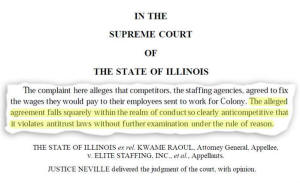Staffing agencies not exempted from antitrust law, state Supreme Court
rules
 Send a link to a friend
Send a link to a friend
[January 23, 2024]
By Hannah Meisel
CAPITOL NEWS ILLINOIS
hmeisel@capitolnewsillinois.com
 Staffing agencies – a fast-growing industry that employs nearly a
million Illinoisans – are not exempt from the state’s antitrust law, the
Illinois Supreme Court ruled late last week. Staffing agencies – a fast-growing industry that employs nearly a
million Illinoisans – are not exempt from the state’s antitrust law, the
Illinois Supreme Court ruled late last week.
The decision comes 3 ½ years after Attorney General Kwame Raoul sued a
trio of staffing agencies, alleging they used their mutual client to
coordinate no-poach agreements, which created a secondary agreement to
pay temp staffers less than the market rate.
In a unanimous 20-page opinion published Friday, the justices quoted a
1979 U.S. Supreme Court opinion that said some agreements “are so
plainly anticompetitive that they are conclusively presumed illegal
without further examination under the rule of reason generally applied
in (antitrust law) cases.”
And the case before the Illinois Supreme Court, the justices said, was
no different.
“The alleged agreement falls squarely within the realm of conduct so
clearly anticompetitive that it violates antitrust laws without further
examination under the rule of reason,” Justice P. Scott Neville wrote
for his colleagues.
The three companies at issue – Elite Staffing Inc., based in Chicago,
Midway Staffing Inc. and Metro Staffing Inc., both headquartered in
Chicago suburbs – all had contracted with a construction company also
located in the suburbs.

Elgin-based Colony Display LLC designs and builds display models and
custom furniture for commercial properties like motels, grocery stores
and restaurants. While the company operates in seven states, Colony
manufactures, assembles and houses most of its furniture in three
Illinois facilities.
The vast majority of Colony’s workforce is temporary. According to court
records, at any given time the company “employs approximately 75 to 100
full-time employees,” compared with “between 200 to 1,000 temporary
workers,” the original complaint alleged.
The staffing agencies’ contracts with Colony gave the company sole
discretion over hiring, firing and assigning workers. And, the lawsuit
alleged, the staffing agencies began to take advantage of that setup as
early as 2018, communicating with each other via Colony.
“For example, many Midway employees wanted to switch to Elite because
they were ‘not happy working for Midway’; they cited ‘pay issues’ and a
lack of communication and support from their employer,” according to
court records.
In response, Midway Staffing allegedly asked Colony for assistance in
“squashing” the transfer of employees, resulting in Colony informing
Elite Staffing that hiring other agencies’ employees was “bad practice”
and wasn’t allowed. Elite Staffing then produced its own policy to
Colony, which the company then forwarded on to Midway Staffing, thus
enforcing the no-poaching policy, according to Raoul’s office.
[to top of second column]
|

Justice P. Scott Neville wrote the Illinois Supreme Court’s
unanimous opinion that staffing agencies are not exempt from the
state’s antitrust laws. (Capitol News Illinois illustration)

In a settlement reached just before oral arguments on the related cases
in November, Colony agreed to pay out $1.2 million to compensate the
temporary workers impacted by the no-poach agreements.
But the staffing agencies went ahead with their appeal to the court,
claiming their business models exclude them from the state’s Antitrust
Act, basing their legal arguments on a 1980s update to a key definition
in the law.
The law prohibits “restraint of trade” that decreases competition
between “persons engaged in commerce and trade,” and then further
defines commerce and trade as “all economic activity involving or
relating to any commodity or service.”
The staffing agencies point to that 1980s-era update that defines
service as anything that isn’t a commodity. The definition also
stipulates that “service” doesn’t include “labor which is performed by
natural persons as employees of others.”
While the justices acknowledged the language of the law was “ambiguous,”
Neville wrote that they must look back in history to determine the
purpose of the exclusion for “services.”
The court looked back at 1960s-era commentary from the Chicago Bar
Association’s Committee on Antitrust Law, which had a hand in drafting
the Illinois Antitrust Act, as well as an article by one of the law’s
big proponents, Northwestern University law professor and leading
antitrust expert James Rahl. Combing through the historical record,
Neville wrote, the justices found the exemption was written solely for
the benefit of labor unions.
“Like the bar committee, Rahl emphasizes the need to exempt legitimate
union activity from the reach of the Illinois Antitrust Act and the
correlative exemption for agreements between employers in the course of
negotiations with unions,” Neville wrote. “No source concerning the
purpose of antitrust laws suggests that the legislature meant to leave
competing employers free to collude with each other to reduce the wages
they pay to their employees or to collude to prevent workers from
switching to better jobs.”
In a statement Friday, Raoul praised the justices’ decision.
“The Illinois Supreme Court has confirmed that Illinois’ Antitrust Act
prohibits agreements among employers to restrict worker mobility and fix
wages,” Raoul said. “I am pleased with this important result. My office
will continue to enforce Illinois’ statutes to protect the rights of
workers to seek better employment opportunities, wages and benefits,
which allow them to support themselves and their families.”
Capitol News Illinois is
a nonprofit, nonpartisan news service covering state government. It is
distributed to hundreds of print and broadcast outlets statewide. It is
funded primarily by the Illinois Press Foundation and the Robert R.
McCormick Foundation, along with major contributions from the Illinois
Broadcasters Foundation and Southern Illinois Editorial Association. |